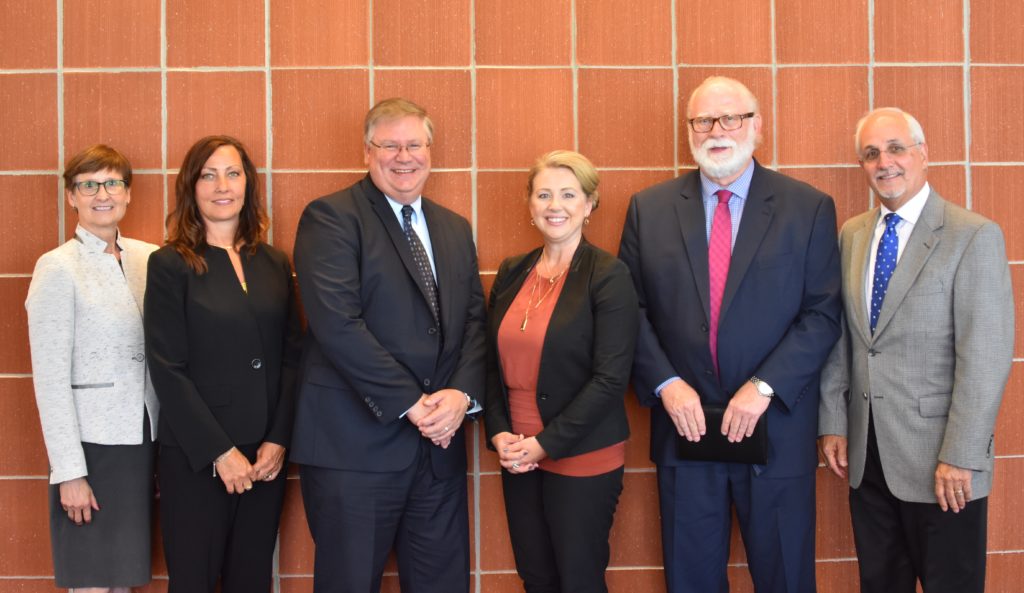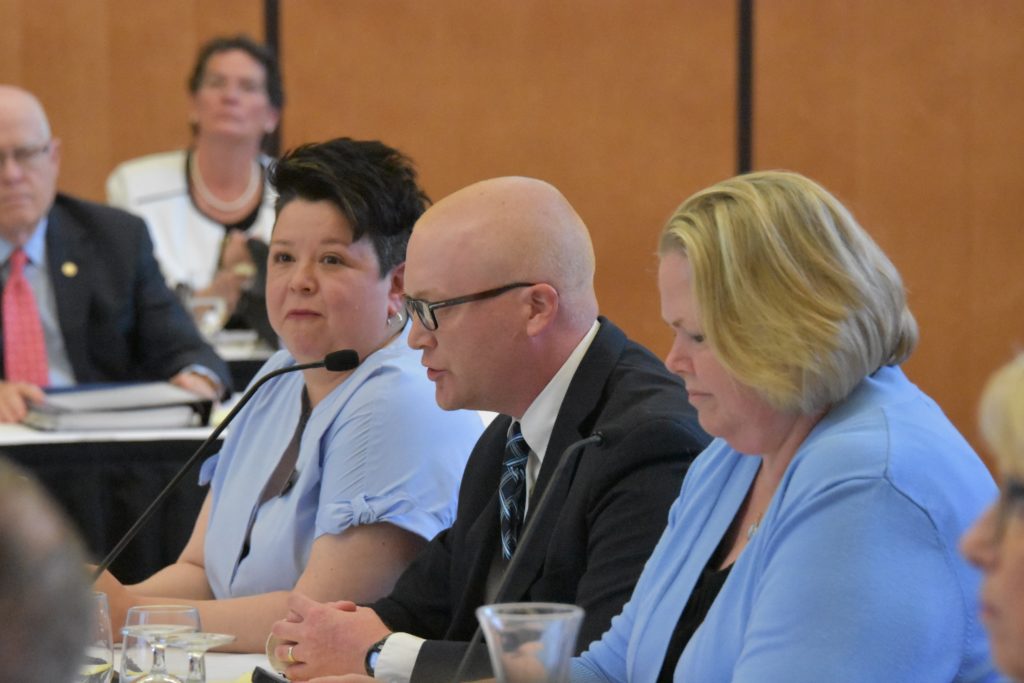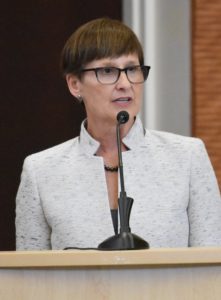MADISON, Wis.–The University of Wisconsin System Board of Regents unanimously voted to approve a $6.382 billion annual operating budget for 2019-20 at its meeting Thursday in Madison.
In introducing the budget, UW System President Ray Cross reiterated the need to use every dollar wisely and in ways that serve students, faculty, and campus communities.
Cross identified three key takeaways of the annual budget:
- The amount and format of State/GPR funding will be defined by a plan approved by the Board of Regents and then presented to Joint Finance. This process has not been used previously.
- Resident undergraduate tuition is frozen for the seventh consecutive year for four-year institutions and for the 11th time in 13 years for two-year campuses.
- Typical cost of attendance for an in-state student living on campus will increase by 0.9% at UW System’s 4-year institutions and by 0.8% at the two-year campuses.
“Preserving the quality of a UW education as tuition remains frozen will require operational investments by the state and our federal partners,” Cross said. “Pursuing additional operational investments will continue to be a priority for the UW System.”
“We need to continue to have the dialogue on the importance of reinvestment in the UW System so we are not diluting the quality of a UW education,” said Regent President Drew S. Petersen. “I would challenge this board and everyone in this room to make this case.”
Other budget highlights:
- Total segregated fees will increase at 4-year institutions by an average $36 per year (2.7%)
- Room and board rates will increase at 4-year institutions by an average $105 per year (1.4%)
- Unrestricted program revenue balances continue to decline.
UW System as driver of innovation
President Cross set the theme for the July meeting, addressing how our universities are a key driver of innovation throughout Wisconsin.
“Fostering the innovative people, ideas and resources of the UW System is key to empowering entrepreneurs and business owners,” Cross said. “These private partners need our students, faculty and research to develop new opportunities that are essential to keeping Wisconsin’s economy vibrant.”
Cross noted that innovative thinking to meet the needs of students and the state is also what drives new program offerings as well as efforts to address some of society’s most pressing concerns.
“What’s important is that innovation – and a willingness to foster, promote and support that innovative thinking – is crucial to having a vibrant future and a healthy economy,” Cross said.
SBDCs foster, support small business success
The mission of the UW System’s Institute for Business & Entrepreneurship (IBE) is to serve Wisconsin’s aspiring, new, and established small businesses by connecting them to resources, information and services that improve and increase capabilities for success.
One of IBE’s five program units is the Wisconsin Small Business Development Center (SBDC) Network. This network, which has 13 centers located around the state, has helped start more than 1,200 businesses and supported capital investments of nearly $400 million since 2014.
- See UW System news release: UW System empowers small business innovation
- See the IBE PowerPoint, “Access Empowers Innovation”
IBE Associate Director and SBDC Network State Director Bon Wikenheiser led a wide-ranging panel discussion regarding the customer-focused perspectives and success stories of the SBDC Network.

from left: Bon Wikenheiser, State Director, Wisconsin Small Business Development Center Network; Colleen Merrill, UW-Oshkosh SBDC Director and Alta Resources Center for Entrepreneurship and Innovation Executive Director; Kevin Kaufman, UW-Whitewater SBDC Director and Wisconsin Innovation Service Center Director; Danielle Campeau, UW-River Falls SBDC Director and St. Croix Valley Business Innovation Center Director; Dale Jorgenson, River Falls Economic Development Corporate Board Member; and Mark Lange, Executive Director, Institute for Business Entrepreneurship
Looking at next steps for student behavioral health

from left: Chris Navia, UW System’s Associate Vice President for Student Success; UW-Superior Dean of Students Harry Anderson; and UW-Stout Dean of Students Sandra Scott
Following up on a Board presentation in April, the UW System is assessing student behavioral health needs and existing services at its 13 universities with an eye toward recommending additional approaches early next year.
Chris Navia, Associate Vice President for Student Success, told Regents that work groups have been formed which include subject matter experts and representation from across the UW System. The groups will make recommendations over the next few months. The UW System has already begun taking stock of services provided on campuses and collecting ideas for improvements, Navia said.
- See UW System news release: UW System reviewing student behavioral health services
- See the UW System PowerPoint, “Student Behavioral Health: Current Efforts and Next Steps”
One work group will review crisis management services for students at risk of suicide or self-harm. A second will look at targeted interventions for vulnerable student populations including veterans, students of color, and LGBTQ students. A third will study ways to foster healthy learning environments.
UW System officials will also seek to identify resources and explore state and national partnerships on the issue.
“We are not going to solve these issues in the short-term, but I think there are still things we can do in the short-run,” said Regent President Petersen.
Preplanning in the works for updating administrative processes
Rob Cramer, UW System Vice President for Administration, and Laurent Heller, UW-Madison’s Vice Chancellor for Finance and Administration, led an update on preplanning efforts to standardize administrative processes supported by a new cloud-based enterprise resource planning system.
“Fortunately, these projects are getting more mature across the country, so we’ve taken the opportunity to learn from our colleagues,” Heller said. The preplanning team has visited four other universities who are already making this transition in order to learn from their successes and mistakes.
New colleagues introduced
The Board welcomed two new members of the Board of Regents.
Becky Levzow, recently elected president of the Wisconsin Technical College System, is owner and operator with her husband of a 180-cow, sixth-generation dairy farm near Rio, Wis. She is also employed at Meriter Hospital in Madison as an ultrasound and nuclear medicine technician.
Edmund Manydeeds returns to the Board for his second term, having previously served 2010-17. Manydeeds is an attorney with Richie, Guettinger & Manydeeds in Eau Claire. A member of the Standing Rock Sioux tribe, he is a graduate of UW-Superior with a law degree from UW-Madison.
President Cross also introduced Dwight Watson, the next chancellor at UW-Whitewater, who will officially start on Aug. 1. Watson comes to the UW from Southwest Minnesota State University, where he served as Provost and Vice President of Academic and Student Affairs.
Education Committee
Karen Schmitt, Interim Vice President for Academic and Student Affairs, provided an update on the UW System Digital Learning Environment (DLE) Transformation project that was launched in 2016. She said the project is currently on schedule for implementing Canvas as the shared digital hub for the comprehensive institutions and UW-Milwaukee by June 2020.
Schmitt said more than 7,400 courses were supported by Canvas this past spring across these institutions – which doesn’t include the large number of courses supported by Canvas at UW-Madison, which has been implementing Canvas as a separate project.
“By July 2020, the DLE will be in full use by all UW System institutions creating a systemwide teaching and learning community that will continue to explore how the DLE can be utilized to positively impact student retention rates and learning outcomes,” Schmitt said.
In other business, the Education Committee:
- Approved UW-Eau Claire’s request for a Bachelor of Science in Biomedical Engineering. Students will learn how medical devices interface to living organisms, how mechanical aspects of living organisms can be understood and augmented, how materials foreign to an organism elicit a response, and how such materials can be modified to be more biocompatible;
- Approved UW-Eau Claire’s request for a Bachelor of Arts and Bachelor of Science in Public Health, an interdisciplinary field which takes a population-based approach to improving the health and well-being of people and communities;
- Approved UW-Green Bay’s request for a Master of Science in Sport, Exercise, and Performance Psychology (SEPP) in the College of Arts, Humanities, and Social Sciences. SEPP is an interdisciplinary subfield of psychology that applies psychological knowledge and clinical approaches to optimize the performance and well-being of athletes, exercisers, musicians, and members of the military;
- Approved UW-Madison’s request for a Master of Science in Design Plus Innovation (Design + Innovation). The program is a collaboration among the College of Engineering, the School of Human Ecology, the School of Business, the Art Department within the School of Education, and the Information School in the College of Letters and Science. This interdisciplinary approach is essential to the program’s ability to combine science, creativity and innovation;
- Approved UW-Platteville’s request for a Master of Science in Strategic Management (MSSM), a program designed for working, mid-career professionals who seek an advanced management degree for promotion in their organizations and responsive to industry’s continued need for employees with advanced management skills and knowledge;
- Approved UW-River Fall’s request for a Bachelor of Science in Biomedical and Health Science, responding to a growing demand for students prepared for careers in the biomedical and health sciences. It will provide students with a solid foundation in understanding human physiology, health, and disease;
- Approved UW-River Fall’s request for a Master of Science in Strength and Conditioning, responding to faculty and student interest and an identified market need for graduates with advanced strength and conditioning training;
- Approved UW-Whitewater’s request for a Master of Science in Education in Higher Education Leadership. This program responds to the growing professionalization of the higher education field, where a post-baccalaureate degree is increasingly required for entry-level administrative positions at technical schools, colleges, and universities;
- Approved the Policies and Procedures Relating to Faculty Layoff and Termination for UW-La Crosse and UW-Platteville. All UW System institutions are required to submit for approval by the Board of Regents any institutional policy developed in accord with RPD 20-24. Since 2016, five other UW Institutions have sought such approval: UW-Green Bay, UW-Madison, UW-Parkside, UW-River Falls, and UW-Stevens Point; and
- Heard an update on the UW System Task Force for Advancing Teacher Education and School Leaders for Wisconsin.
Business and Finance Committee
Vice President for Administration Rob Cramer provided a high-level update on several projects including the UW Restructuring Project, the Project Management update, and UW-Shared Services.
In other business, the Business and Finance Committee:
- Approved UW-Milwaukee’s Sponsored Research Agreement with Wisconsin Electric Power Company to provide archaeological and architectural/historical research and field activities to advise Wisconsin Electric Power Company with regard to impacts of their projects on the cultural environment;
- Approved UW-Milwaukee’s an Contractual Agreement with Rockwell Automation Inc. to establish guidelines and processes under which third parties may become members of UW-Milwaukee’s Connected Systems Institute (CSI), which is committed to conducting advanced research related to digital manufacturing;
- Approved UW-Madison’s Contractual Agreements with Viewpoint Therapeutics for service related to interpretation of ophthalmic (eye) images in clinical studies;
- Approved UW-Madison’s Contractual Agreement with Foundation for Food and Agriculture Research, Inari Agriculture Inc., KWS SAAT SE, and Syngenta Crop Protection, LLC for a study focusing on tolerance to transient-water stress of maize at the flowering and grain-filling stage;
- A previously noticed proposal for a contractual agreement between UW-Milwaukee and Oxford International was withdrawn;
- Heard an update from Senior Associate Vice President and Chief Human Resource Officer Shenita Brokenburr on the UW System Title and Total Compensation Project, its current progress, and next steps in the project implementation; and
- Heard a report by Associate Vice President and Chief Information Officer Steven Hopper on the status of 19 large IT projects underway in the UW System.
Capital Planning and Budget Committee
In an update on the 2019-21 Capital Budget, Associate Vice President Alex Roe told Regents that despite several project not being approved, the overall capital budget was “fabulous.” She said it was a “full court press” effort at the Capitol involving Chancellors from every institution as well as other staff at the institutional and System level that produced the largely successful budget.
- Approved UW-Madison’s request for authority to execute the remainder of the design contract and construct the UW-managed Red Gym Renovation project for $2 million Gift/Grant funds. All work on the building, which was constructed in 1894 and is listed on the National Register of Historic Places, will be coordinated with the Wisconsin Historical Society;
- Approved UW-Madison’s request to enter into a lease of space for the Division of Information Technology that will provide office space for a unit of DoIT that does not need to be physically located on-campus. The move would create critical office space for new Computer Sciences staff who are expected to start work next fall;
- Approved UW System’s request to construct two 2017-19 Classroom Renovation/Instructional Technology Improvement Program projects for an estimated total cost of $1.7 million, one at UW-Oshkosh and one at UW-Stevens Point. The funding will be utilized to update existing general assignment classroom and laboratory instructional environments including associated furnishings and equipment to improve instructional technology;
- Approved UW System’s request for authority to construct four All Agency Maintenance and Repair projects at an estimated cost of $5.6 million. Projects include UW-River Falls’ University Center entry and terrace renovation; UW-Stout’s Price Commons kitchen hood replacement; and heating plant fuel reliability upgrades at both UW-La Crosse and UW-Oshkosh;
- Approved UW System’s request to rescind and remove Regent Policy Document 19-7, “Development of Facilities in the University of Wisconsin Colleges,” because the policy is obsolete due to the recent restructuring of UW System; and
- Approved UW-Oshkosh’s request for authority to rename its campuses: University of Wisconsin-Oshkosh, Fond du Lac campus; University of Wisconsin-Oshkosh, Fox Cities campus; and University of Wisconsin-Oshkosh, Oshkosh campus.
Research, Economic Development & Innovation Committee
Rebecca Deschane, the UW System-Wisconsin Economic Development Corporation (WEDC) joint liaison for talent development, highlighted current and planned efforts to strengthen talent development, attraction, and retention initiatives across multiple statewide organizations and geographies. She said key focus areas include efforts to expand opportunities for students to connect with career opportunities and internship initiatives, community and business engagement, and outreach to alumni, veterans, and young professionals.
In other business, the REDI Committee:
- Heard an update from Vincent Rice, WEDC’s Vice President of Sector Strategy Development, on current initiatives, with a focus on WEDC’s efforts to build stronger industry-university collaborations and to support additional opportunities for internships, talent development, and job creation;
- Heard an overview of current initiatives from Buckley Brinkman, executive director and CEO of the Wisconsin Center for Manufacturing & Productivity. WCMP consults with growth-oriented manufacturers across the state to identify and help implement best practices in areas of automation, robotics, and smart manufacturing; and
- Heard a report on key impacts and outcomes of the Ideadvance Seed Fund and Small Business Innovation Research program, which is a joint UW-WEDC effort, from Idella Yamben, who serves as Ideadvance’s New Idea Concierge. The program was recognized for excellence in 2018 by University-Industry Innovation Network.
Audit Committee
Vice President of Finance Sean Nelson and Vice President of Administration Rob Cramer provided additional details on UW System’s response to a LAB report that was discussed at the last Board meeting. Regents heard that workgroups will be established with key deliverables including engaging internal audit while developing a process for reviewing proposed policies. A report to LAB and the Regents on progress toward recommendations will be provided.
In other business, the Audit Committee:
- Heard an update from Chief Audit Executive Lori Stortz on Fiscal 2020 Audit Plan She also provided a high-level overview of the progress management has made toward resolving comments and implementing recommendations included in audit reports, as well as an update on System security and access audits at each institution; and
- General Counsel Quinn Williams and Director of Compliance Katie Ignatowski provided an update on compliance issues.
The UW System Board of Regents will resume its meeting on Friday, July 12, 2019, at 9 a.m. in Madison.

